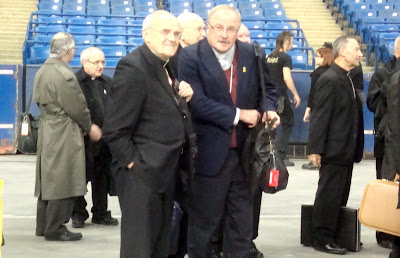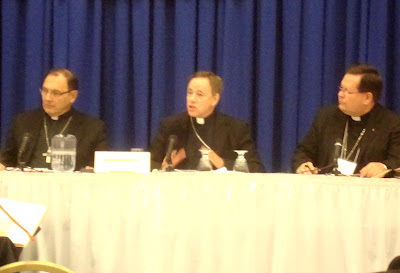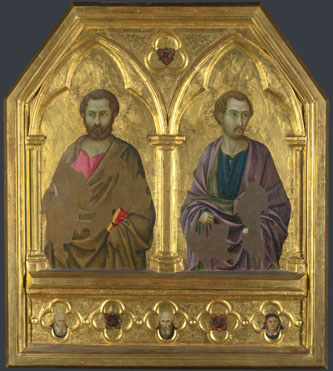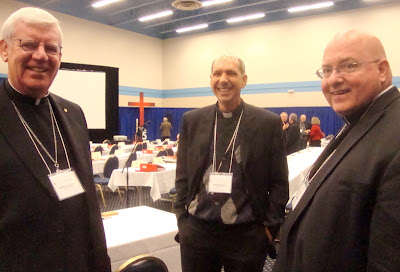Today's epistle prepares us for the teaching about the end-times that will begin to colour the liturgy in these closing weeks of the year. Meantime, the Book of Wisdom and Jesus' encounter with Zacchaeus tell of God's mercy to those who repent.
The Book of Wisdom was composed in Greek, late in the first century BC, at Alexandria, one of the largest centres of Diaspora Jews. The author--evidently well-acquainted with Hellenistic rhetoric, philosophy and culture--wrote at a time of crisis for believers.

Many Jews had abandoned their faith for pagan religions or secular philosophies. Some combined aspects of these secular outlooks on life into a hybrid version of faith. The age-old problem of retribution--why do the wicked prosper and the virtuous suffer?--troubled people.
The wise man addressed their concerns by speaking of God's providence--divine care for creation--in prayer form. With logic he showed that God is simultaneously all-powerful and merciful: 'You ... overlook people's sins, so that they may repent; ... You would not have made anything if you had hated it; ...Your immortal spirit is in all things; ... therefore You correct little by little those who trespass...'.
God's mercy and love, he said, are proof not of weakness but of divine power. For God has a purpose in guiding people gently. Through tenderness God warns people of the ways in which they sin so they may be 'freed from wickedness and put their trust' in God.
The sage saw teaching God's mercy as a way of encouraging people to conversion. He placed personal responsibility for taking the path of repentance squarely on the shoulders of all who contemplate God's care for the world.
Jericho, the "city of palms", was the last stopping-off spot before people began the long, steep ascent to Jerusalem. So when Jesus reached Jericho attentive gospel readers (and hearers) would know His journey was ending.
Jericho served as a demarcation post, as it does today between Israel and the Palestinian Authority. Near Jericho the people of Israel had entered the Promised Land under an earlier Yeshua (Joshua 1-6). Though translated differently, Joshua and Jesus are variations of the same Hebrew name.
Jericho's border status made it a place for toll collectors. One of them--a head tax collector--features prominently in today's gospel.
Luke focuses on the inner dynamic of Jesus' meeting with Zacchaeus, short for "Zachariah" meaning "the righteous one". Manifestly, Zacchaeus did not live up to his name until Jesus went to stay at his house. Small of stature, Zacchaeus did not let this impede his desire to see Jesus, but climbed a sycamore tree to see Him passing by. And with joyful abandon, he accepted Jesus' decision to stay at his house.
Jericho near the Jordan serves as a biblical icon of the "salvation" God yearns to give to sinners. Such salvation was the outcome of Jesus' encounter with Zacchaeus ('Today salvation has come to this house...for the Son of Man came to seek out and to save the lost').
Zacchaeus' change of heart, proven by promises made to Jesus, of restitution and sacrificial giving to the poor, indicates the wise way in which Jesus implemented God's gentleness toward sinners.
Both Thessalonian epistles reveal Paul's advice about what must happen in the end days. Yet they differ from each other in the details given, and the second echoes the structure and language of the first. Plausibly, then, Second Thessalonians contains Paul's take on issues not mentioned in First Thessalonians or his correction of misinterpretations of things he had said in the earlier letter about 'the coming of our Lord Jesus Christ and our being gathered together with him'.
Paul reassured the Thessalonian Christians that, while Christ's end-time rule has already begun, it has not yet come to be in all its fullness (note his reference to the false belief 'that the day of the Lord is already here').
God's purpose is that, through Jesus, all may ultimately share in the Kingdom, once Christ has won the final victory over the enemies of His Church, even death itself. This is the consoling message of Second Thessalonians and of other scriptural readings in these last weeks of the liturgical year.
* * * * * *
SAINT BROTHER ANDRE THANKSGIVING MASS (PHOTOS)
Homily of Cardinal Jean-Claude Turcotte, Archbishop of Montreal:
Dear friends,
Brother André lived in an era quite different than our own. Having died in 1937, he did not know nor could have foreseen the profound transformations that occurred in our society and in our Church since the 1960s. In many ways, his manner of thinking, his manner of being, his words, his expressions of Christian faith, and his piety differ from our own. He is from another era, one could say.
He had not yet been recognized officially as a saint; and the Church never canonizes someone solely for who he was and how he lived before. She canonizes someone also for what he has to say to and show the men and women of today. What then does he have to say to us? What then can be shown to us by Brother André, who, in his time, was recognized as a great miracle worker and had the audacity to undertake construction, on Mount Royal, of what would become the largest oratory dedicated to Saint Joseph. He first tells us and shows us that life is beautiful and fruitful when it is oriented towards listening to and serving others.
Brother André was a man of attentiveness and compassion. He left it up to all those who were unhappy—rich or poor—to approach him. Very often, he went to those who could not come to him. Almost every day, in his office, for hours and hours, he lent his ear. He made himself attentive to those who confided in him their misfortunes, their sufferings, their illnesses, their disappointments, their failures, their unhappiness… After listening, he comforted them. He called them to courage and hope. He exhorted them to trust in God. He prayed a lot for those who spoke to him. He prayed to God. He prayed to Mary. With fervour, he prayed to St. Joseph, he prayed before Christ on the Cross.
One of his friends, Mr. Joseph Pichette, said of him, “Before leaving to visit the sick, he took us to pray with him in the chapel, and he would pray for a long time. During his visits with the sick, he would ask us from time to time to drive him to the church, where he sometimes prayed for an hour or more.”
What Brother André also tells us and shows us is that life is worth living in the company of God. In God, Brother André had a living faith. Not an intellectual faith. Not a complicated faith. Not a faith learned from books. A faith received on the knees of his mother. A faith informed by long times of prayer and meditation. A faith that was bathed in love. If there was one thing that the brother was certain of, it was the love of God. It pleased him to say, “How the good God is good! How He takes care of us!” He also loved to say, “The good God loves us so much, infinitely, he wants us to love Him.”
Brother André never doubted the love God had for him. The sufferings that he had to endure—and they were many—never led him to think that God had grown distant or had lost interest in him. Brother André spoke on this subject in words that were simple, yet surprising and luminous. He said, “Those who suffer have something to offer to the good God.” He said, “Don’t ask that your trials would be lifted; ask God more for the grace to bear them well.” He said, “Place yourselves in the hands of the good God; He abandons no one in adversity.” We live in an era when it’s tempting to think that one can live without reference to God. Brother André reminds us that what gives flavour to life and makes it fruitful is living it with God, in His intimacy and in His love.
Brother André was convinced that God could use him to accomplish wonderful things. For many decades, people came to him as a worker of wonders. It never went to his head. In fact, he often said: “The world is silly if it thinks that Brother André is doing miracles. It is the good God who does the miracles. Saint Joseph obtains them.”And, following Saint Paul, he said, in reference to God, “An artist makes the most beautiful paintings with the smallest of brushes”.
This is not a small Saint that has been canonized, but a great, great one. This great saint—Brother André—is from our home. Among our parents and grandparents, or among the friends of our parents and grandparents, many knew him. He lived close to us on Mount Royal and said, “When I die, I’ll be much closer to the good God than I am now, I will have much more power to help you.”
Brother André…Saint Brother André, we pray to you, keep your promise. Pray for us: pray that we become women and men of attentiveness and compassion, women and men who love God with a great love because they know they are very loved by Him, women and men who, having become “disciples” of Jesus, become “meek and humble of heart” like Him and in Him find “rest”.
AMEN
* * * * * *
Jesuit Brother Porter-Saint
Jesuits on October 31 generally celebrate a feast in honour of Saint Alphonsus Rodriguez, a man who touched many lives as he served as porter at their college in Majorca, Spain. While the Jesuit brothers will be feted today, the liturgical memorial is not held this year as it falls on the Lord's Day.
Alphonsus is renowned for mystical writings that only became known after his death and for the influential role he played in encouraging the missionary vocation of St. Peter Claver.
The English poet Gerard Manley Hopkins wrote a wonderful poem that sees the drama of nature and sanctification taking place in the undramatic action taking place at the door where Alphonsus served as porter (as in the case of the recently-canonized St. Brother André):
In honour of St. Alphonsus Rodríguez, Laybrother of the Society of Jesus
by Gerard Manley Hopkins, S.J.HONOUR is flashed off exploit, so we say;
And those strokes once that gashed flesh or galled shield
Should tongue that time now, trumpet now that field,
And, on the fighter, forge his glorious day.
On Christ they do and on the martyr may;
But be the war within, the brand we wield
Unseen, the heroic breast not outward-steeled,
Earth hears no hurtle then from fiercest fray.
Yet God (that hews mountain and continent,
Earth, all, out; who, with trickling increment,
Veins violets and tall trees makes more and more)
Could crowd career with conquest while there went
Those years and years by of world without event
That in Majorca Alfonso watched the door.





















































